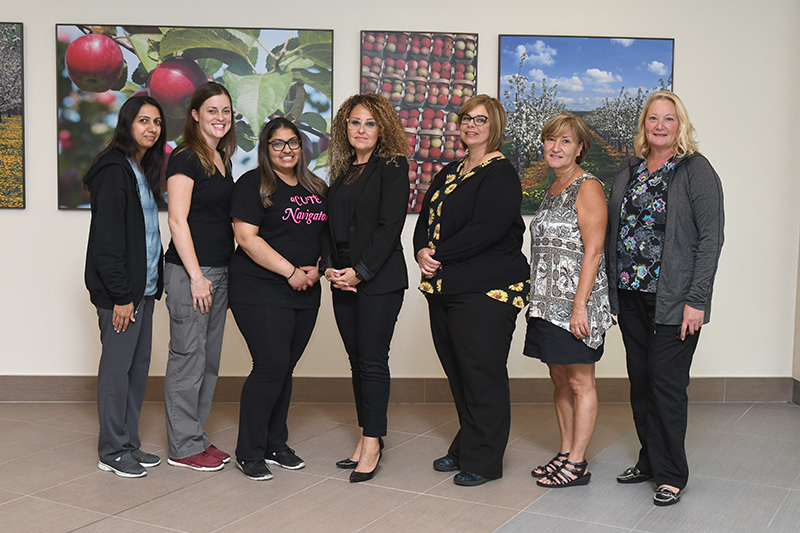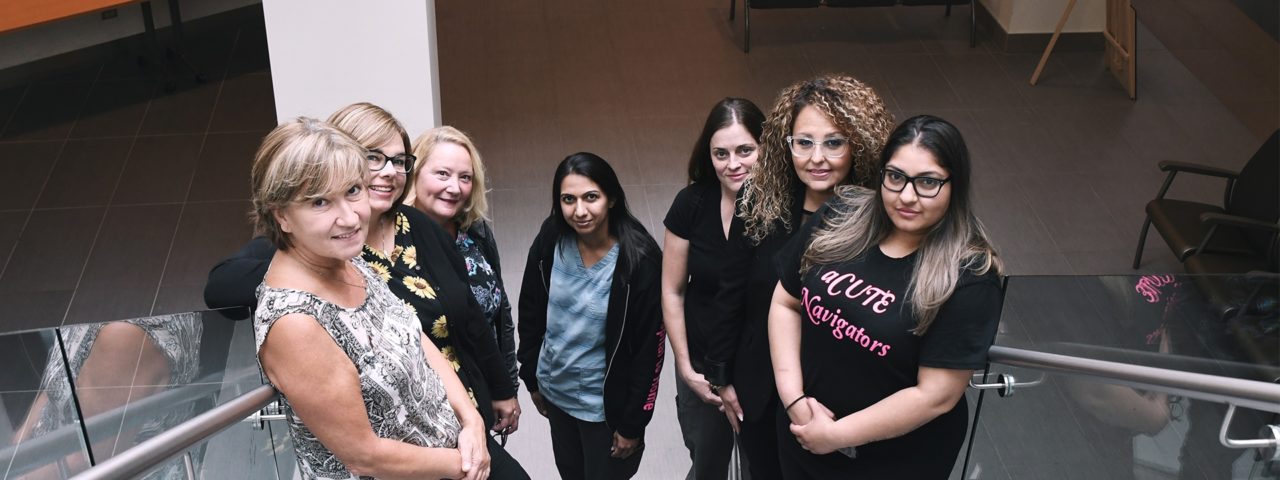Clinical Navigators Put Patients Front and Centre at MSH

When Marina Dietl went to see her family doctor for a knee appointment, she didn’t expect to walk away with a diagnosis for breast cancer.
“It feels like everything happens very quickly— sometimes you don’t have time to think,” she says. “While you’re trying to process the idea of having cancer, you also have to navigate going from one appointment to another.”
What usually follows is a stressful series of doctor and clinic visits, worrisome delays, surgery, treatments and fragmented information. Patients are responsible for booking appointments and coordinating treatments, all while coping with overwhelming fear.
That’s why Markham Stouffville Hospital (MSH) has introduced clinical navigators in several departments, including the Breast Health Centre. These specialized registered nurses guide the patient through their entire care journey—while they’re in hospital and even after they’re discharged—and help them connect with resources in the community.
In November 2016, after being sent for a routine mammogram, Marina was asked to come into MSH for a biopsy. The results were positive—with cancerous spots discovered. Throughout this process, she was guided by her clinical navigator, Pamela Anderson, who is one of two clinical navigators at the Breast Health Centre.
“Pamela put me in priority queue and the next morning I had an MRI set up. Things moved very quickly and smoothly—a testament to the wonderful teamwork they have at MSH,” says Marina. “They set up all my appointments and I just had to show up.”
From the family physician’s office, it might take two weeks to see a specialist, another week to get a biopsy and another week to get the results—adding to a patient’s stress. The clinical navigator streamlines that; not only do they make all appointments on behalf of the patient, they speed up the entire process and coordinate the entire care team at MSH.
Pamela guided Marina through her consultations, examinations and all the care necessary to diagnose and treat her cancer in a timely, coordinated and compassionate manner. She was also there if family members had questions.
“It gives you a go-to person who can immediately answer any questions or concerns, and if they don’t have the answer they will certainly get the answer for you,” says Marina.
She admits that the hardest part was telling her two children, Kyra and Evan, that she had cancer—and clinical navigators can even help with that too.
“I meet people at their worst moment,” says Pamela. “They gravitate to you because you’re their lifeline. And I’m your person, I’m your No. 1 cheerleader.”
Pamela’s role also includes education and support. “I’m not changing their minds or offering my own opinions, but sometimes they need clarification of their diagnosis or treatment plan, and I support their decisions,” she says. “Or if there are times within their journey when they have a fearful moment I’m available to them to chat.”
The clinical navigation program builds on the patient-centred care offered at MSH. “This hospital is committed to delivering an extraordinary patient experience and the patient navigation model of care is an important part of that commitment,” says Michelle Samm, director of patient experience at MSH.
Navigating patients through the care experience within the hospital and beyond means creating an integrated care journey, which is rooted in trust, respect and compassion. “Navigation is part of the role of many clinicians across the organization,” Michelle says, “but we realized if we had a dedicated clinical navigator role, that would lead to better, more seamless care.”
That person becomes a key point of contact for patients if they have any questions, whether in hospital or at home—no matter if it’s help finding an insert for their bra after a mastectomy or finding a service provider to help clear their driveway of snow.
“Navigators are part of the circle of care and other members of the interprofessional team at MSH know they can contact the navigator to assist with coordinating the patient’s care,” says Michelle. The idea is to improve the overall experience for all patients, potentially resulting in shorter wait times and reduced lengths of stay in hospital, with improved connections to community resources after discharge.
In addition to the breast health navigator, there are clinical navigators in childbirth, orthopaedic surgery, paediatric diabetes, oncology services, hospital to home services and mental health who help patients and families navigate the healthcare system. Ultimately, the plan is to develop a framework to scale the program across MSH.
This kind of collaboration ensures patients receive high quality care, and is also intended to help relieve their anxiety and uncertainty, allowing for a better state of mind for recovery.
Marina is now in remission, but her journey continues. As part of the clinical navigation initiative, Pamela will continue to follow up with her for five years.
In recognition of the great care she received, Marina also wants to gratefully give back. Her husband is a martial arts instructor, so her family came up with the idea of a fundraiser for the Breast Health Centre: a self-defence class for women with a theme of ‘fight like a survivor.’ They’ve had two successful fundraisers so far and they’re planning a third event this coming spring.
“I want the funds to go directly to the Breast Health Centre because I feel there is such a need for them to continue what they’re doing,” says Marina. “It’s our honour to give back because they’ve done so much for me.
“People don’t understand it, but I get excited about going back to see everyone at the hospital,” says Marina. “They’re such a wonderful group of people … it becomes your comfort … Clinical navigators put patients one and your home.”
This article originally appeared in the Saturday, October 5th issue of the Toronto Star.
